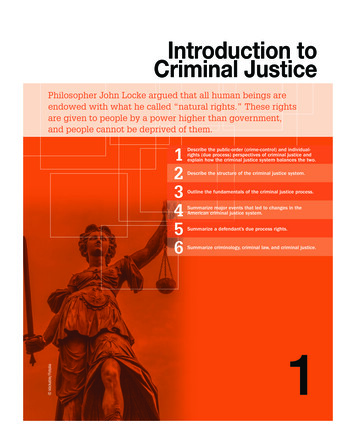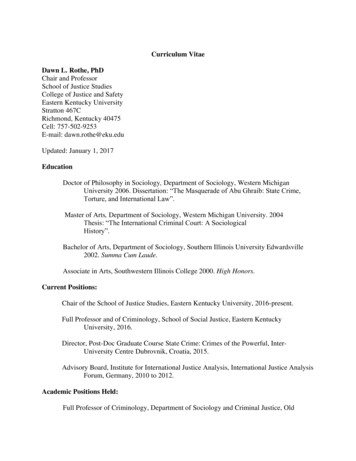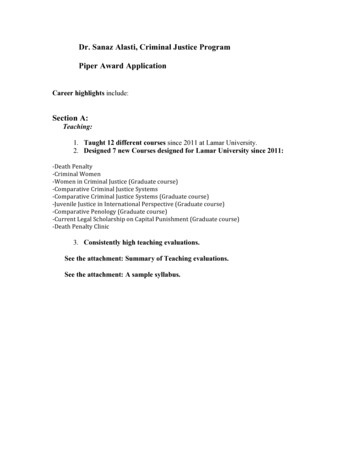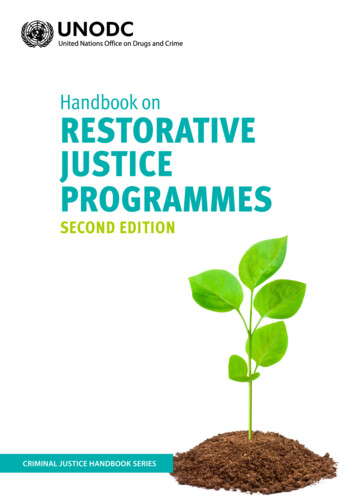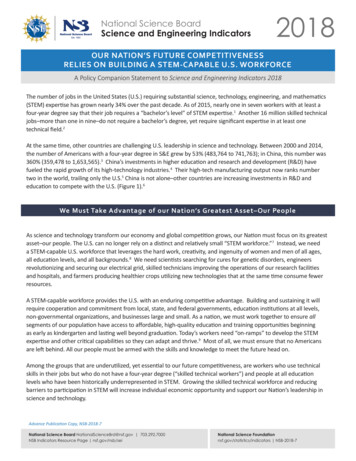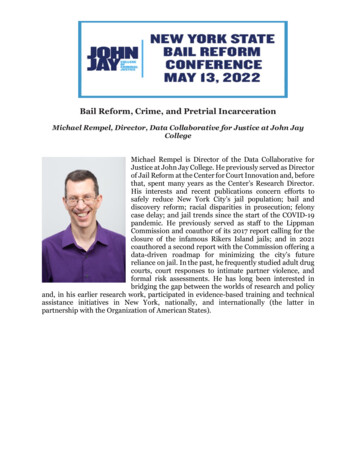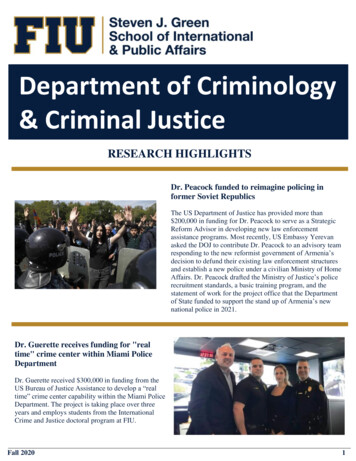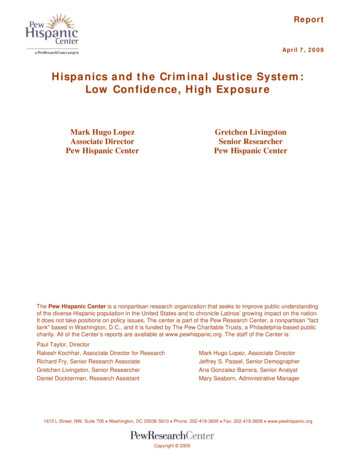
Transcription
ll/ Pew ::r ReportH1SPClTIlCCenterApril 7, 2009Hispanics and the Criminal Justice System:Low Confidence, High ExposureMark Hugo LopezAssociate DirectorPew Hispanic CenterGretchen LivingstonSenior ResearcherPew Hispanic CenterThe Pew Hispanic Center is a nonpartisan research organization that seeks to improve public understandingof the diverse Hispanic population in the United States and to chronicle Latinos' growing impact on the nation.It does not take positions on policy issues. The center is part of the Pew Research Center, a nonpartisan "facttank" based in Washington, D.C., and it is funded by The Pew Charitable Trusts, a Philadelphia-based publiccharity. All of the Center’s reports are available at www.pewhispanic.org. The staff of the Center is:Paul Taylor, DirectorRakesh Kochhar, Associate Director for ResearchRichard Fry, Senior Research AssociateGretchen Livingston, Senior ResearcherDaniel Dockterman, Research AssistantMark Hugo Lopez, Associate DirectorJeffrey S. Passel, Senior DemographerAna Gonzalez-Barrera, Senior AnalystMary Seaborn, Administrative Manager1615 L Street, NW, Suite 700 Washington, DC 20036-5610 Phone: 202-419-3600 Fax: 202-419-3608 www.pewhispanic.orgPewResearchCenterCopyright 2009
Hispanics and the Criminal Justice System: Low Confidence, High ExposureExecutive SummaryAt a time when Latinos are interacting morethan ever with police, courts and prisons,their confidence in the U.S. criminal justicesystem is closer to the low levels expressedby blacks than to the high levels expressedby whites, according to a pair of nationwidesurveys by the Pew Research Center. 1Figure 1Confidence in the Legal System,by Race and EthnicityOlH!Sricn: How rot'fidenr lire y w A great deal/A fair amountr! .Jr.! (%) Just someN fy littlePolice officer; in your community will do a good jobenforcing the lawWhitesSix-in-ten (61%) Hispanics say they have agreat deal or a fair amount of confidence thatthe police in their local communities will doa good job enforcing the law, compared with78% of whites and 55% of blacks. Just underhalf (46%) of Hispanics say they haveconfidence that police officers will not useexcessive force on suspects, compared with73% of whites and 38% of blacks. Similarly,just under half of Hispanics say they areconfident that police officers will treatHispanics fairly (45%) and that courts willtreat Hispanics fairly (49%). In comparison,74% of whites and 37% of blacks say theyhave confidence that the police will treatblacks and whites equally (Pew Social &Demographic Trends, 2007).HispanicsBlacksPolice officers in your community will not use excessiveforce on suspectsWhitesHispanicsBlacksCourts in your community will treat Hispanics fairly44Note; Responses of"Oon't know" an" "Refused" not shown. Whrtesinclude only non-Hi ank whites, 61acks indude only non-HispankblacksSource; Hi ank results f'om Pew Hispanic Center 200I:I National Surveyof Latinos; whrte and black ,esults ,,"om Pew Social & DemographicTrends. "Blacks SeoeGrowing Values Gap !lel:ween Poor and MiddleClass;Optimism about Black Progress nes." November 2007In recent decades, Hispanics’ exposure to allparts of the criminal justice system has riseneven faster than their rising share of the U.S. adult population. In state, federaland local prisons and jails, the share of inmates who were Hispanic increasedfrom 16% in 2000 to 20% in 2008 (West and Sabol, 2009). During this period, theshare of Hispanics in the adult U.S. population rose from 11% to 13%.Overall, according to the Pew Center on the States, some 4% of adult Hispanics in2007 were either in prison or jail or on probation or parole. This is larger than theshare of whites (2%) who were under some form of corrections control in 2007and smaller than the share of blacks (9%).1The Pew Hispanic Center National Survey of Latinos 2008 sampled 2,015 Hispanic adults between June 9 and July 13,2008. The Pew Social & Demographic Trends Project’s Racial Attitudes in America Survey sampled 3,086 adultsbetween September 5 and October 6, 2007.Pew Hispanic CenterApril 7, 2009
Hispanics and the Criminal Justice System: Low Confidence, High ExposureAs for rates of violent crime victimization,Hispanic levels (28.4 per 1,000 individuals)were higher than those of whites (23.9 per1,000) and lower than those of blacks (32.9 per1,000) in 2006 (Bureau of Justice Statistics,2008). 2 In the past 15 years, rates ofvictimization for all three groups have fallen bymore than half (Catalano, 2006).iiFigure 2Confidence in Equal Treatment by Police,by Race and Ethnicity(96 Sdying"A great dear or '"A ("ir "mount?How confident are you that policeofficers in your community will . ?Treat Hispanics fairlyHispanicsTreat blacks and whiles equallyThis report is based on a bilingual telephonesurvey of a nationally representative sample of2,015 Hispanics ages 18 and older. Interviewswere conducted from June 9 through July 13,2008, by the Pew Hispanic Center, a project ofthe Pew Research Center. The margin of errorfor the sample is plus or minus 2.8 percentagepoints at the 95% confidence level. For adescription of the survey methodology, seeAppendix 1.WhitesBlacksNOIe, ResponSt!sof"Don know" and "Refused" nOl shown. Wh esinclude only non·Hi panic whites. Blacks include only non·HispanicblacksSource: Hispanic resuks from Pew Hispanoc Center 2008 NationalSurvey of Latinos; white and block resuks from Pew ocial &Demographic Trends. "Blacks See Growing Values Gap 8e(weenPoor and Middle Class; Oplimismaboul BI""k Progress Declines,"November 2007Other key findings of the report:2 More than one-third (35%) of Latinos report that there are areas within amile of their home where they are afraid to walk alone at night, similar tothe share of the general population that feels the same way (37%). More than three-quarters (78%) of Hispanics say that if they were a victimof a violent crime, they would definitely report that crime to the police. Overall, more than half (56%) of Latinos say they or an immediate familymember had contact with the criminal justice system in the previous fiveyears. Contact includes reporting a crime to the police, serving on a jury,being arrested, being on probation or parole, or serving time in jail orprison. Among all Hispanics, 27% say they or an immediate family member hadreported a crime in the previous five years. Nearly one-quarter (23%) of Hispanics say they or an immediate familymember had been questioned by the police (for any reason) in the previousfive years.Victimization rates reported by the Bureau of Justice Statistics for whites and blacks include the Hispanic portions of thosepopulations.Pew Hispanic CenterApril 7, 2009
Hispanics and the Criminal Justice System: Low Confidence, High Exposure Among all Hispanics, 15% say they or someone in their immediate familyhad been arrested in the previous five years. Some 17% of Latinos say they or an immediate family member had beenunder some kind of criminal corrections control in the previous five years.Pew Hispanic CenteriiiApril 7, 2009
Hispanics and the Criminal Justice System: Low Confidence, High ExposureivAbout this ReportThe 2008 National Survey of Latinos asked Hispanic adults about their views ofthe police and courts in their communities, their perceptions of crime and anyinteraction they or their immediate family members have had with the criminaljustice system. The survey was conducted from June 9 through July 13, 2008,among a randomly selected, nationally representative sample of 2,015 Hispanicadults. The survey was conducted in both English and Spanish. The margin oferror for the full sample is plus or minus 2.8 percentage points at the 95%confidence level.A Note on TerminologyThe terms “Latino” and “Hispanic” are used interchangeably in this report, as arethe terms “foreign born” and “immigrant.”The terms “whites” and “blacks” are used to refer to the non-Hispaniccomponents of their population unless otherwise noted.About the AuthorsMark Hugo Lopez is the associate director of the Pew Hispanic Center. Prior tojoining the Center, Lopez was research director of the Center for Information andResearch on Civic Learning and Engagement as well as an assistant professor atthe University of Maryland’s School of Public Policy. His areas of expertiseinclude crime, labor economics, civic engagement, and voting behavior. Hereceived his Ph.D. in economics from Princeton University.Gretchen Livingston is a senior researcher at the Pew Hispanic Center. Herprimary areas of interest include immigrant adaptation, gender, social networksand family structure. She earned her Ph.D. in demography and sociology from theUniversity of Pennsylvania. Prior to joining the Pew Hispanic Center, she was avisiting research fellow at the Princeton University Office of PopulationResearch.Recommended CitationLopez, Mark Hugo and Gretchen Livingston. “Hispanics and the Criminal JusticeSystem: Low Confidence, High Exposure.” Pew Hispanic Center, Washington,D.C. (April 7, 2009).Pew Hispanic CenterApril 7, 2009
Hispanics and the Criminal Justice System: Low Confidence, High ExposurevAcknowledgmentsThe authors thank Paul Taylor for his editorial and intellectual guidance. We alsothank Cary L. Funk, Scott Keeter, Rakesh Kochhar, Susan Minushkin, FelisaGonzales and Michael T. Light for their guidance in the development of thesurvey questionnaire. Daniel Dockterman provided outstanding support for theproduction of the report. Ana Gonzalez-Barrera checked numbers in the report.Marcia Kramer was the copy editor.Pew Hispanic CenterApril 7, 2009
Hispanics and the Criminal Justice System: Low Confidence, High ExposureviContentsExecutive Summary . iiAbout this Report. ivA Note on Terminology . ivAbout the Authors. ivRecommended Citation. ivAcknowledgments. vContents . viConfidence in the Criminal Justice System . 1Reporting Crimes to the Police . 3Reporting Violent Crime. 3Reporting Property Crime. 4Contact with the Criminal Justice System . 6Reporting Crime to the Police. 6Being Questioned by the Police. 7Serving on a Jury . 7Attending Court on a Criminal Matter. 7Being Arrested . 7Interacting with the Corrections System. 7Serving as a Sworn Witness in Court . 8Neighborhood Safety . 8References. 9Appendix A: Survey Methodology. 10Appendix B: National Survey of Latinos 2008, Topline . 12Pew Hispanic CenterApril 7, 2009
Hispanics and the Criminal Justice System: Low Confidence, High Exposure1Confidence in the Criminal Justice SystemSix-in-10 (61%) Hispanics report aFigure 3Confidence in the Legal System Among Hispanicsgreat deal or a fair amount ofOlH!Stion: How confident "r y"" t! .Jt.! (%)confidence that police officers in theircommunity will do a good job of Just someNery little A great deal/A fair amountenforcing the law, and 57% arePolice officers in your commun;ty wilkconfident that police will do a good jobDoa good job36enforcing the lawof dealing with gangs. However, thisDoa good jobstill leaves a notable minority who hold38dealing with gangsa negative opinion about policeNot use excessive47force on suspectsbehavior. A plurality (47%) expressjust some or very little confidence thatTreat Hispanics failly50police will avoid using excessive forceon suspects, while 46% have a greatCourts in your community will:deal or a fair amount of confidence.44Treat Hispanics faillyHalf (50%) of Hispanics have just someor very little confidence that police willNOle; Responses of "Don't know" and "Refused" nO( shownSource; Pew Hispanic Center 2000 National Survey of Latinostreat Hispanics fairly, while 45% feel agreat deal or a fair amount of confidence thatFigure 4the treatment will be fair. In regard to theConfidence in the Legal System,courts, 44% of Hispanics have just some orby Race and Ethnicityvery little confidence that they will treatOuestion: H 'w mntkknt''''e you t! .Jtpolice officers In your community wiR. ? (%)Hispanics fairly, and 49% have a great deal A great deal/A fair amount Just someNery littleor a fair amount of confidence that courtsDo a good job enforcing the lawwill treat Hispanics fairly.Two of the five questions about confidence inthe legal system asked of Latinos in 2008were also asked of blacks and whites in 2007(Pew Social & Demographic Trends, 2007).On those questions, levels of confidenceamong Latinos fall between the levelsreported by whites and blacks. Nearly eightin-ten (78%) whites have a great deal or a fairamount of confidence in their local police todo a good job enforcing laws, while 61% ofLatinos and 55% of blacks share thatsentiment. Nearly three-quarters (73%) ofwhites report a great deal or a fair amount ofconfidence that police will not use excessivePew Hispanic CenterWhitesHisp.micsBlacksNot use excessive force on suspectsWhitesHisp.micsBlacksNOle: Responses of "Don't now" and "Refused" not shown. Whitesinclude only non-Hispanic whites. Blac"" include only non·HispanicblacksSource: Hispanic results from Pew Hispanic Comter 2008 Nalional Surveyof Latinos; white and black results I,om Pew Soc,,1 & Detn09 aphicTromds. "Blacks SooGrowing Values Gap Between Poor and MiddleClass;Oplimiwn about Black Progress Declines," Novembe 2007April 7, 2009
Hispanics and the Criminal Justice System: Low Confidence, High Exposureforce on suspects, while 46% of Latinos and38% of blacks express the same opinion.A similar pattern emerges on the issue of policetreatment of minorities. While Latinos wereasked about their confidence that police wouldtreat Latinos fairly, in 2007 blacks and whiteswere asked an analogous question about theirconfidence that police officers treat blacks andwhites equally. Nearly three-quarters (74%) ofwhites had a great deal or a fair amount ofconfidence that police treat blacks and whitesequally. Half as many (37%) blacks reported thesame. In comparison, 45% of Latinos state thatthey feel a great deal or a fair amount ofconfidence that police will treat Hispanicsfairly.Young Latinos generally are less confident inthe justice system than are older Latinos. While54% of Latinos ages 18 to 29 have a great dealor a fair amount of confidence that the policewill do a good job of enforcing the law, thisshare is lower than the share of Latinos ages 30to 39 (62%), ages 40 to 54 (66%) and ages 55 orolder (67%) who say the same.2Figure 5Confidence in Equal Treatment by Police,by Race and Ethnicity(96 . aying "Agreat d&lr or 'A lair amcwnt")How confident are you that policeofficers in your community will . ?Treat Hispanics fairlyTreat blacks and whites equallyWhitesBlacksNote: Re pOnsesof"Oon know";mel "Refused" not shown. Whitesindude only non-Hispanic whites. 81;,,:k indude only non-HispanicblacksSource: Hispanic resuks from Pew Hispanic Center 2008 NationalSurvey of Latinos; white and black resuks from Pew Social &Demographic Trends. "81;,,:ks See Growing Values Gap 8etweenPoor and Middle Class; Optimismabout Bklck Progress [)e;:lines,"November 2007Figure 6Younger Hispanics LessConfident in Law Enforcement(96 . aying "Agreat d&lr or 'A I"ir "mcwnt7How confident are you that police officers in yourcommunity will do a good job enforcing the law?On three out of five confidence measures,immigrant Latinos report less confidence in thelegal system than do native-born Latinos. Half(50%) of native-born Latinos report a great dealor a fair amount of confidence that police willavoid using excessive force on suspects, whileSource: Pew Hispanic Cente, 2008 National Survey of Latinos42% of immigrant Latinos express the samelevel of confidence. Fifty-one percent of native-born Latinos are confident thatpolice will treat Hispanics fairly, compared with 40% of the foreign born. Six-inten (60%) native-born Latinos feel a great deal or a fair amount of confidence thatthe courts will treat Hispanics fairly. In contrast, 42% of immigrant Latinos saythe same.Pew Hispanic CenterApril 7, 2009
Hispanics and the Criminal Justice System: Low Confidence, High Exposure3Reporting Crimes to the PoliceReporting Violent Crime 3Nearly eight-in-ten (78%) Hispanics statethat if they were a victim of a violentcrime, they would definitely report theincident to the police. The likelihood ofreporting a violent crime incident differsby age, education and gender. Latinos ages30 or older are more likely than Latinosages 18 to 29 to say they would definitelyreport a violent crime incident to thepolice—84% versus 69%. Latinos with atleast some college education (86%) aremore likely to say they would definitelyreport a violent crime than are Latinoswith a high school diploma (76%) or thosewith less than a high school diploma(77%). Women are more likely than mento say they definitely would report being avictim of a violent crime—82% versus75%.Table 1Likelihood of Reporting Crime IncidentsAmong Hispanics(96 who S ly that ift y were" crime vierim,they would definitely r.port thecrl",.)ViolentcrimeBurglary orproperty shipU.s. lNativityNative bornForeign bornAgo18-2930-3940-5455 Educational Attainmentless than high schoolHigh school diplomaSome college or higherFemale93"Source: Pew Hispanic Cente, 2008 National Su,vey of LatinosWhile most Latinos say that if they were a victim of a violent crime, they wouldreport that incident to the police, a small share (5%) say they probably ordefinitely would not report the crime. Among those who say they would notreport being a victim of a violent crime, nearly three-in-ten (29%) cite a fear ofrepercussions, such as immigration enforcement or discrimination, as a reason tonot contact the police. Among immigrant Latinos who say they would not report aviolent crime, 42% say they would fear repercussions if they reported theincident, compared with 18% of the native born. The second most common reasonrespondents cite for not reporting a violent crime incident is that they don’t expectthe police to respond. More than one-quarter (26%) of Latinos who say theywould not report being the victim of a violent crime identify this reason. Amongimmigrants who say they would not report a violent crime, 30% cite a perceivedlack of response from the police as the reason versus 22% among the native born.3The National Survey of Latinos 2008 question regarding reporting violent crime to the police did not define violent crime.Pew Hispanic CenterApril 7, 2009
Hispanics and the Criminal Justice System: Low Confidence, High Exposure4Criminal VictimizationPersonal crime victimization rates among Hispanics in 2006 (28.4 per 1,000 individuals) were higher than therates for whites (23.9 per 1,000) and lower than the rates for blacks (32.9 per 1,000 individuals), according to theBureau of Justice Statistics’ National Crime Victimization Survey (NCVS). While Hispanics were more likely thanwhites to state on the NCVS that they were a victim of a personal crime in 2006, they were less likely (41.6%) tosay they reported the incident to the police than white (48.3%) or black (55.0%) victims. Victimization and policereporting rates for whites and blacks include the Hispanic portions of those populations.Property crime victimization rates among Hispanic households were 211.7 incidents per 1,000 households in2006, compared with 156.7 per 1,000 white households and 185.6 per 1,000 black households. As was the casewith personal crime, the share of Hispanic (33.5%) property crime victims who say they reported incidents to thepolice was lower than that of white (37.7%) or black (38.8%) victims.Personal crime victimizations include such crimes as rape, sexual assault, robbery, aggravated assault andsimple assault. Property crime victimizations include household burglary, motor vehicle theft and property theft.In 2006 there were 6.3 million personal crimes and 19 million property crimes in the United States, according tothe NCVS. Overall, the national personal crime rate per 1,000 individuals ages 12 or older was 25.4, and thenational property crime rate per 1,000 households was 160.5.The NCVS, an annual survey of more than 70,000U.S. households, is the most comprehensive survey of criminal victimization available. Respondents are askedabout all criminal incidents in that calendar year, including those not reported to the police, in which they were avictim.Reporting Property CrimeWhen asked if they would report a burglary or property crime to the police if theywere a victim of that crime, more than eight-in-ten (84%) Hispanics say theydefinitely would. A greater share of Latinos ages 30 and older, compared withLatinos ages 18 to 29, say they would definitely report a burglary or propertycrime—87% versus 79%. Latinos with at least some college education are morelikely than those with less than a high school diploma to say they would reportsuch a crime—93% versus 80%.Among the small share (4%) of Latinos who say they would not report a burglaryor property crime, more than half (52%) cite a perceived lack of response fromthe police as the reason for not reporting the incident. The second most commonreason for not reporting a burglary or property crime incident to the police is afear of repercussions for reporting such a crime. More than two-in-ten (21%)Latinos who would not report being a victim of a burglary or property crime citethat reason.Pew Hispanic CenterApril 7, 2009
Hispanics and the Criminal Justice System: Low Confidence, High Exposure5Hate CrimesAccording to the FBI, 7,624 bias-motivated crimes were reported in 2007 (FBI, 2007). Among these, 595 weredirected against Hispanics, representing 8% of all bias-motivated crimes. In comparison, 2,658 bias-motivatedcrimes were reported against blacks and 749 against whites. Since 1990, the FBI, through its Uniform CrimeReports data collection, has compiled data on all reported crime incidents that had a bias motivation against avictim’s perceived race, religion, disability, sexual orientation or ethnic/national origin group.Figure7Number of Reported Bias·Motivated Crimes,by Race and Ethnicity of Victim, 1995-20073,5003,0002,500 ic01995 1996 1997 1998 1999 2000 2001 2002 2003 2004 2005 2006 2007Note, Religious bias, se u.1 o'lentotion bias, and other bias c imes are not shown.Sou.ce: Pew Hispanic C. te n.lysis offal UnifoffTl Crime Reports D.ta. 1995-2007Pew Hispanic CenterApril 7, 2009
Hispanics and the Criminal Justice System: Low Confidence, High Exposure6Contact with the Criminal Justice System4Individuals can interact with the criminal justice system in many ways, and thatinteraction affects not only them personally but their families as well. Overall,56% of Latinos say they or someone in their immediate family had interacted withthe criminal justice system in at least one of the following ways in the five yearspreceding the survey: Reporting a crime to police (27%) Being questioned by the police for anyreason (23%) Serving on a jury (21%) Attending court on a criminal matter,excluding minor traffic violations and/orjury duty (19%) Being arrested (15%) Being on probation or parole (13%) Serving time in jail and/or prison (12%) Being a sworn witness in court (11%)FigureSInteraction with the Criminal Justice SystemAmong Hispanics(96 saying "",y Jr an immediatl' ramily ml'mbl'r intl'",cred with I""sySlem in /hl' fivl' Y""rs prKl'dingI"" SUrVl'y)Reported crimeQuestioned by policeServed on juryAttended court oncriminal matterWas arrestedWas on probationor paroleServed time in prisonWas a sworn witnessin courtSourc ' p w Hi nk Center2008 National SUtv y of LatinosReporting Crime to the PoliceMore than one-quarter (27%) of Hispanics say they or a family member reporteda crime in the previous five years. Native-born Hispanics are twice as likely asforeign-born Hispanics to say this—38% versus 19%. Hispanics ages 54 andyounger are more likely to say they reported a crime than those ages 55 andolder—29% versus 19%. Hispanics with at least some college education (40%)are also more likely to say they reported a crime than Hispanics with a highschool diploma (30%) or those with less education (17%).4The shares of non-citizen Hispanics who interact with the criminal justice system are likely to be low because non-citizenHispanics who are in the United States without documentation may have been deported after being arrested or havingserved a prison or probation sentence.Pew Hispanic CenterApril 7, 2009
Hispanics and the Criminal Justice System: Low Confidence, High Exposure7Being Questioned by the PoliceNearly one-quarter (23%) of Latinos say they or an immediate family memberwere questioned by the police in the previous five years. Native-born Latinos aremore likely than immigrant Latinos to say this—32% versus 17%. And Latinosunder the age of 30 are more likely than older Hispanics to say this—32% versus19%. Among Latinos with at least some college education, 30% say they or afamily member had been questioned by the police in the previous five years, agreater share than those who are only high school graduates (23%) or have lessthan a high school education (19%). U.S. citizen Hispanics are more likely thannon-U.S. citizen Hispanics to say they were questioned by the police—28%versus 15%.Serving on a JuryMore than two-in-ten (21%) Hispanics say they or an immediate family memberserved on a jury in the previous five years. Hispanics over age 55 (30%) are morelikely to say they or an immediate family member had served on a jury than arethose ages 40 to 54 (22%), ages 30 to 39 (14%) or ages 18 to 29 (19%). AndHispanics with some college education (33%) are more likely to say they or animmediate family member served on a jury than are Hispanics with a high schooldiploma (18%) or those with less than a high school diploma (14%).Attending Court on a Criminal MatterNearly two-in-ten (19%) Latinos say they or an immediate family member hadattended court on a criminal matter other than a minor traffic violation or juryduty in the previous five years. Latinos between ages 18 and 30 are more likely tosay this than Latinos ages 55 and older—23% versus 13%.Being ArrestedAmong Latinos, 15% say they or someone in their immediate family was arrestedin the previous five years. Nearly one-quarter (23%) of Latinos ages 18 to 29 saythey or a family member were arrested, compared with 8% of adults ages 55 andolder. And native-born Latinos are more likely than immigrant Latinos to say theyor a family member was arrested—18% versus 13%.Interacting with the Corrections SystemAccording to a recent report from the Pew Center on the States, 1-in-27 (4%)Hispanics in 2007 was under some form of corrections control, such as probation,parole, prison or jail. While 4% of Hispanics are under some kind of correctionscontrol, more than four times (17%) as many say they or someone in theirimmediate family had been under corrections control in the previous five years.Native-born Latinos are more likely to report this than are immigrant Latinos—23% versus 13%. More than one-fourth (26%) of Latinos ages 18 to 29 say theyPew Hispanic CenterApril 7, 2009
Hispanics and the Criminal Justice System: Low Confidence, High Exposure8or an immediate family member had been on probation or parole, or served timein prison or jail.Overall, 13% of Latinos say they or an immediate family member had been onprobation or parole. Young Latinos ages 18 to 29 are more likely than Latinosages 30 or older to say they had been on probation or parole—19% versus 10%.Also, native-born Latinos are twice as likely as foreign-born Latinos to say theyhad been on probation or parole—18% versus 9%.More than one-in-ten Latinos (12%) say they or someone in their immediatefamily served time in prison or jail in the previous five years. Native-born Latinosare more than twice as likely as immigrant Latinos to say that—18% versus 8%.And nearly two-in-ten (18%) Latinos ages 18 to 29 say they or someone in theirfamily served time in jail or prison in the previous five years, double the share ofL
Hispanics and the Criminal Justice System: Low Confidence, High Exposure iii Among all Hispanics, 15% say they or someone in their immediate family had been arrested in the previous five years. Some 17% of Latinos say they or an immediate family member had been under some kind of criminal corrections control in the previous five years.


